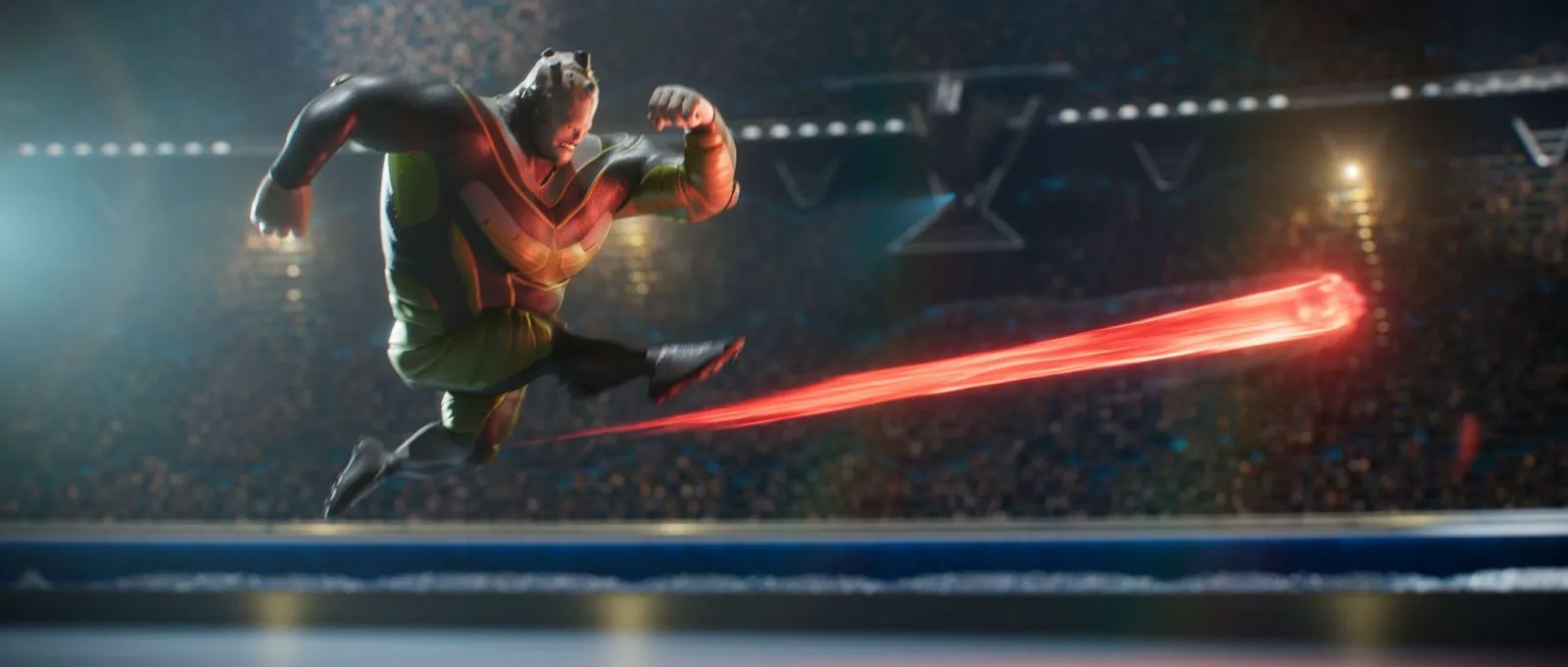Before diving into “Cosmoball” (also known as “Goalkeeper of the Galaxy”), a word of caution: this film is likely to trigger every possible negative reaction in sensitive viewers, from shock and stress to seizures and allergic reactions. The sheer intensity of the carnival of madness pouring from the screen is inescapable.
Directed by Dzhanik Fayziev, a prominent figure in Russian studio cinema (previously known for “The Turkish Gambit,” which seems to be the last Russian film that pleased everyone without exception), “Cosmoball” aimed to demonstrate Russia’s capabilities in filmmaking. A whole cinematic universe was created specifically for the film, with a vast amount of CGI and special effects produced in Russia. The chosen theme was quite unexpected – not since the “Galactic Football” series has anyone attempted to send footballers soaring above the field with the ball. Fayziev’s motives were undoubtedly patriotic. Indeed, Russia has learned to produce large-scale, internationally-appealing films for a relatively small amount of money compared to other national film industries. Of course, this “international level” mainly refers to sales in secondary markets like obscure foreign VOD services, as Russian films are still rarely released abroad and don’t generate significant revenue there.

A Critical Release
The question remains: what kind of film is it? “Cosmoball” was intended to be as important a release for the Russian market as Nolan’s “Tenet” was for the global market – to lure people back to offline cinemas from the clutches of online streaming. The release date was set for Russian Cinema Day, August 27th. In a twist of fate, “Cosmoball” became the first domestic film presented at a major premiere by the new Minister of Culture of the Russian Federation, Olga Lyubimova. Perhaps this wasn’t the first impression she wanted to make. However, in Lyubimova’s defense, the decision to support “Cosmoball” was made before her appointment.
Today, the film, which cost a billion rubles to produce, is projected to earn 50 million rubles during its opening weekend – if it’s lucky. Promotional materials promised a family-friendly film – fast-paced, colorful, wild, but endearing. Perhaps these posters and trailers were a bit too eclectic: unknown creatures, futuristic interiors, young and attractive actors and actresses, and flying droids smiling at us with their screen-faces. This is more akin to what one might expect from a Chinese film, where they tend to throw everything at the wall (and the audience there is accustomed to such variety), rather than a Russian one. Perhaps Fayziev was not initially targeting a domestic audience, but rather aiming to conquer other territories, much like the disastrous “The Mystery of the Dragon Seal.” Or perhaps it was his artistic statement, an attempt to showcase a true geopolitical direction: yes, we are Scythians, yes, we are Asians. In “Cosmoball,” Fayziev pushes everything to the extreme, to the ultimate and highest (or lowest) point. For example, like avant-garde filmmakers, he almost entirely abandons traditional storytelling.

Unraveling the Plot
Describing the plot of “Cosmoball” is very difficult, even though the main storyline is revealed almost directly at the beginning and then painstakingly explained in pathetic monologues and flashbacks. In short, it can be described as follows: In the future, Earth is in a bad state, with global warming, poverty, and other social ills. Aliens have also appeared, with whom the Earth’s team competes in a discipline called cosmoball, a variation on three-dimensional football played in a stadium shaped like a giant dandelion (!) by two teams of four players. The ball must be scored into vertical goals, and the athletes must be able to teleport instantly in space to handle the ball, which is also a nuclear bomb and can explode (this sentence alone gives an idea of the scale of the psychopathic scriptwriting).
While the team is trained by Sensei Belu (Evgeny Mironov), and their matches are watched by the entire world (which has no bread but a spectacular show) with lively commentary from a queer host (Yan Tsapnik), it turns out that not everyone on Earth is happy with what’s happening. Firstly, the main character, Anton (young actor Evgeny Romantsov), is dissatisfied with his life. He is a young loser surrounded by troubles, his mother (Elena Yakovleva) is ill, and he doesn’t like cosmoball. He is outraged that everyone is staring at the sky, where giant screens with broadcasts are hanging, and no one is working. Secondly, a mysterious robot-villain is hiding somewhere deep underground, building a deadly weapon for the mass genocide of Earthlings. At the same time, with the help of his daughter (it is unclear, however, how he gave birth to her), he directs all of Anton’s life’s misfortunes, following a complex and not entirely clear plan to change his DNA, after which the hero also becomes a teleporting athlete and joins the Earth’s cosmoball team. By the way, that deadly weapon looks like a giant furry beast with blue eyes, able to teleport ultra-fast even in space, with the villain sitting inside it, and the unfortunate creature controlled from the outside by a transparent hand with ten fingers flying above it.
Please don’t think that if the retelling is so long, it covers the entire plot of the film. On the contrary, it’s only a small part of it, and without these introductions, understanding the film may not be possible at all, and even with them – not a fact. If the avant-gardists abandoned the narrative to look for new film forms, Fayziev takes an unexpectedly different path: he makes his film so intense that this immoderate concentration of events completely devalues the picture itself. The film seems to be continuously shouting its own findings into space, of which there are many and which are scattered here so generously that not everything can be noticed, there are so many of them. Fayziev seems to be shouting in the viewer’s ear: “And I have the same actor playing the most positive hero, mentor, and the main villain! And I have Mikhail Efremov in police shorts having an affair with Elena Yakovleva in tattoos! And in my film with a 6+ rating, two girls of different races will harass the protagonist with the habits of a virgin! In addition, approximately all Russian artists that exist in principle will play in my film! And I also have a fluffy cute creature that will blow up thousands of ships in orbit at the same time, and they will explode with colorful fireworks!” To be honest, it still seems that much of the film I just imagined, but I don’t have the courage to rewatch “Cosmoball” and check this guess of mine.
A Hodgepodge of References
Of course, many of these crazy ideas are spied on and rethought somewhere, which in the postmodern era, of course, is not a crime. The list of reference films can be continued indefinitely:
- The material world of the dilapidated Earth clearly refers to the Soviet science fiction masterpiece “Kin-dza-dza”;
- The appearance of many characters, including the character of Yan Tsapnik, who for some reason breaks plates on himself in a fit of joy, is politely borrowed from “The Fifth Element”;
- The film itself, in terms of the intensity and colorfulness of the depicted interplanetary world, is reminiscent of another Besson film, the highly underrated “Valerian and the City of a Thousand Planets”;
- By the way, there is little football in the film itself, literally a couple of matches, but quite dynamic, reminiscent of the same animated series “Galactic Football” or the film “Shaolin Soccer”;
- The authors clearly constantly kept “Star Wars” and “Star Trek” in mind - their influence on the genre is so great that you can’t get away from these titanic franchises;
- The blue-eyed furry beast with a characteristic colored detail on its forehead flew here from the animated series “Avatar: The Last Airbender”;
- The robo-family of antagonists - from “The Avengers”, where Thanos also had relatives;
- The villain himself, however, looks more like Ultron from “Age of Ultron”;
- And his daughter - like the heroine of the video game Mass Effect…
And so on, and so on - “Cosmoball” is still waiting for its film critic-researcher, a very patient one.

Where Did It Go Wrong?
It’s time to stop here and understand what went wrong. Anyone will notice this without difficulty - “Cosmoball” does not produce a film for the whole family, or even just for any clearly defined target audience. This film, although presented in the form of a blockbuster, is actually a grandiose artistic act, carried out with an incomprehensible purpose. Either to bite the hand that feeds, to strike the government bodies with the insanity of the film, which subsidize Russian cinema clearly not to one day see something like Fayziev’s creation - but we will reject this hypothesis because it is too conspiratorial. Or the director made this film in order to try to move Russian cinema along a new vector - and this is much more interesting.
The key to understanding “Cosmoball” is graphics. There is a lot of it, it is made in a very schizophrenic style and is very uneven in quality. It is strange that we have to cite “Deadpool” as an example (this is what Russian cinema leads to - even “Deadpool”, it turns out, can serve as a role model), but it was an American studio not very expensive action film, which in fact was not quite a game, but more animated - to make sure of this, it is enough to watch any video about how the battle scenes were made there, which were almost entirely drawn, although the spectacle seems quite realistic. So, “Cosmoball” in many scenes manages to create exactly the opposite impression - where we should see a choreographed fight of heroes, instead we are shown an awkward cartoon. Live actors and special effects drawn on top of them are too badly combined with each other, especially disgusting were the droids-assistants, which were clearly added to the film for children.
Fayziev, in addition to being a significant director of epic cinema, is also listed as the CEO of the large KIT film studio, that is, he is vitally interested in developing the industry, including CGI. “Cosmoball” seems to be the film he has been working towards for many years, from the total costuming of “The Turkish Gambit” through the strange comic “Kolovrat” he got here, to visual poetry, which so far lacks rhythm, style and meaning, but his intention is already commendable. Finally, in order to show our level in cinema and convince the population that Russia is still o-go-go, they are not filming pathos, not thundering weapons of war cinema, but taking the seasoned domestic viewer into the space of pure fantasy, of which there is so much that you get tired of it. Moreover, after rushing through the stream of screaming images offered by “Cosmoball”, you suddenly feel that completely esoteric thoughts creep into your head. Perhaps this was Fayziev’s goal in international markets? It’s easy to imagine viewers who are fond of substances that alter consciousness beginning to idolize Fayziev after seeing his creation in a new way.
Of course, one can only dream of such a thing, but nevertheless, as for me, “Cosmoball” is more beautiful than any “T-34” and “Going Vertical”, and precisely because of its explosive and irrepressible creativity. Yes, so far this film has not even made it out of the group, but has not even qualified for the tournament. But I, surprising myself, will probably wait for Fayziev’s next film and hope that it suddenly, in an unknown way, ends up in the playoffs.